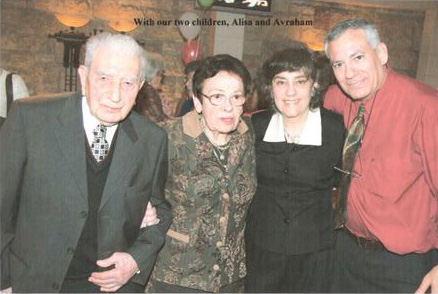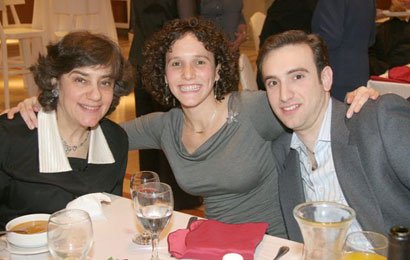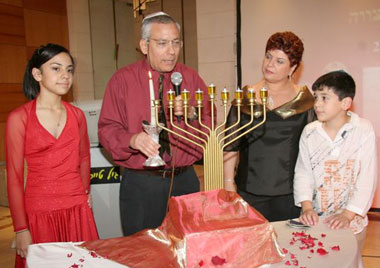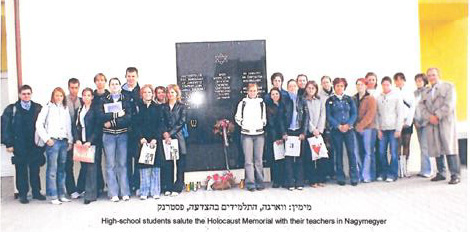| 24. Epilogue | |||
|
We had left the kibbutz in February 1948. Thus apparently, the “adventurous” part of my life came to its end. In this final chapter I would like to summarize what happened to my family and to me in Eretz Yisrael, later named State of Israel. Mother was of course living with us and coped bravely with the difficulties of adaptation. At the time of her arrival she was about 50, but never uttered a word of complaint about the problems we had plenty of. The British Mandate ended on May 15, 1948: the British High Commissioner sailed off from Port Haifa, and all symbols of the British rule were removed from the Jewish regions of the country. Since this day was Shabbat, the Supreme Committee of the Yishuv convened on Friday, May 14, and its Secretary, David Ben-Gurion solemnly declared the establishment of a Jewish State, to be called Medinat Yisrael (State of Israel, as the homeland of the Jewish people, in accordance with the resolution of November 29, 1947. At the same session the committee, which became Israel’s temporary government, ordered the general mobilization of all young men (at that stage only volunteering women joined the army), to ward off the imminent attack by the five neighboring Arab states: Egypt, Iraq, Lebanon, Syria and Transjordan (presently Jordan). I was enlisted that same day, even though I was the sole provider for a senior newcomer, a breast-feeding mother, and a little baby. As a locksmith I was posted to a maintenance workshop for heavy weapons. I was sent to attend a special course (the first one of its kind in the new Israeli army, which I finished as its Number One pupil. I received my first assignment, with the rank of Sergeant Major, to head a maintenance team for all artillery at the Northern front. I lived through fierce battles with the Syrian Army and the so called Arab Liberation Army, which had intruded into Galilee from Lebanon, until they were pushed out of the whole region as far as the International Lebanese border. The young Israeli Army, Tzahal (IDF), pushed back the mighty Egyptian Army plus Jordan’s Arab Legion, together with the remnants of the Iraqi units until a cease-fire was reached in spring 1949. At this stage I was named instructor in the new specialty, Gun Fitter, and later, as civilian employee, foreman in the central maintenance workshop for heavy weapons of the Ordnance Corps. Alisa was growing and her development caused much joy for us as well as for her devoted Grandmother. In 1949 Mother married Emil Grossman, a kind, honest and industrious widower who had lost his former family in the Holcaust. He was a locksmith and part-owner (with his brothers) of a prosperous workshop in Ramat Gan. Mother and Emil lived together happily for about 30 years, in full harmony and mutual understanding. Emil always acted like a natural father, father-in-law, and grandfather. In the fall of 1958 I was appointed manager of the biggest factory of electric and solar water heaters in Israel. I managed to raise the factory’s productivity and to improve product quality significantly. For years I was member of the national committee for standardizing the quality requirements of this widely used domestic appliance—a committee affiliated with the Israeli Office of Standards and Specifications. On the eve of the Six-Day War, the French president, General de Gaulle, imposed a weapons embargo on Israel. The Israeli Air Force needed spare parts for its French-made fighter planes and French government refused to supply them. Thereupon, a Monsieur Shidlowski, the owner of the jet engine plant Turbomeca, rushed to the rescue by establishing Manoei Beit Shemes, (Beit Shmesh Engines) as an affiliate plant in Israel. A crew of engineers and technicians spent several months in the main factory in France learning the special aeronautic technology required for manufacturing these jet engines. I liked the idea of this revolutionary activity and offered my services to the new management. Taking into account my former experience as an instructor in the Army, I was hired and assigned to establish and manage a technological Training Center for specialists needed by the new affiliate plant. I assembled a crew of excellent craftsmen, and our school became a model for all similar “Continuing-Education Centers” in the country. Israel’s Minister of Labor visited our Center and was more than satisfied with, in his words, “the pride of the ministry.” Around the time when the first group of trained specialists were ready for their final tests, Mr. Shidlowski arrived with an entourage of French plant managers and supervisors for the opening ceremony of his new plant on January 1, 1969. The guests visited our Center and Monsieur Shidlowski was overwhelmed by its efficient organization and by the high professional standard of the trainees. As a reward he invited me to visit the mother plant and training center in France as his personal guest I made that visit with Haya in the spring of 1969. The wonderful Mediterranean cruise by itself was an unforgettable experience. Monsieur Shidlowski welcomed us most cordially at his residence in Bordes, a small town near Pau in the Southwest of France. The next day, he showed us his near-by training center. (I had the feeling that he was showing off just a little bit.) Another day he sent his limousine to fetch me for a sightseeing tour in his two-engine plane. We flew over the whole area as far as the Atlantic shore. I also spent several days in the plant itself, enjoying technological innovations I had not known before. When we came to say good-bye, the Boss enquired about our further plans. I told him that we would spend a few days in Paris and continue to Switzerland and Italy. He suggested that we be ready the next morning, and his driver would take us to the airport, from where his airplane would take us to Paris. We thanked him for everything and parted with a warm handshake. We flew from Pau to Paris, where an impressive limousine took us from the airport to our hotel. I spent about ten pleasant years in the employ of Manoei Beit Shemesh. The main disadvantage of this job was its distance, about 30-32 miles from Ramat Gan. It was tiring to commute so far daily, as it had been to Hadera earlier. To ease this burden I landed a more convenient position in the Ahad Haam branch of Bank Leumi in Tel Aviv (about 15-20 minutes drive from my home). Which had occupied its new marble building a month or two earlier. My function was varied: as Mayor Domo I was responsible for the maintenance of he building, water, electricity, air-conditioning and computer network; I was also controlling the supply of office equipment and business forms used; at last, but not least, I was manger of the vault, which leased about 1,000 safe-deposit boxes and hence conducted clients (after proper identification) to their boxes, where they could perform their business in perfect privacy. The box renters were mostly older people who came consider me their friend and personal counselor. Many of them entrusted me with their private and family problems and consulted me in delicate personal matters. When I reached the age of retirement, many costumers urged the bank management, which received approval from the central headquarters—not just once, but twice—to prolong my employment, I retired at the age of 74, to the regret of my aged clients and friends. I acquired my first PC back in 1987; I did not want to lag behind my grandchildren who took computer classes at school. This was a challenge for me, but the word-processor made writing much easier, and the enormous potential of the Internet facilitated wonderful contacts worldwide. Mother left us in 1980 at the age of 86 after a long illness, and we mourned her passing deeply. I had loved and greatly respected this extraordinary woman, who loved and treated me as her own son. Soon after her passing we left our old comfortable 2½-room apartment in Ramat Gan that we had acquired in 1957, and moved to Givatayim into a more spacious apartment, where we had prepared with special facilities for Mother to join us—a move accompanied by mixed feelings. My brother Józsi (Joseph) and my sisters Blanka and Margit, together with my beloved parents, were murdered in Auschwitz (in June 15, 1944, when the train arrived from Nagymegyer in Birkenau). After the fortunate ending of the Bergen-Belsen detention of the “pilot group”, my broher Ernő (Ernest) Yehuda returned from Switzerland to the reestablished Czechoslovakia, where he was elected Chairman of the Zionist Organization, a post he held until the early fifties. Then he made aliyah with his wife Shoshana and little daughter Shula and settled in Kibbutz Haogen near Hadera. He became night-editor of the daily Al Hamishmar. He moved to New York in 1960 and, after acquiring his PhD in Judaica, worked as Journalist and editor of the Jewish periodical Lamishpaha. Yehuda was a very special person, whose charm, wide knowledge and refined humor made him beloved everywhere. He passed of a heart attack in January 1982. His only daughter, Shulamit, lives in Eilat. My sister Frida passed of a long illness on New Year’s Eve of 2000. Her son Eli and daughter Orna are living in Ramat Gan. My sister Rózsi (Rose) Tzivon died about half a year later, in June of 2000. Her son Yigal lives with his wife Irit and their three children in kibbutz Sdei Yoav, near Negba. Out of eight siblings, only two of us remain alive – Sara in kibbutz Negba and myself. Sara and her husband Yasha have three daughters, nine grandchildren and seven great-grandchildren. They are a happy and close-knit family.
Our son Avraham was born in June 1951. He was a very cute child and an excellent student whom everybody loved, included his elementary and high school teachers. Both Alisa and Avraham, graduated from Ohel Shem high school in Ramat Gan with high marks and received their academic degrees at Tel Aviv University. Alisa earned her MSc in Immunology, and Avraham his MD as a physician. In 1973 Alisa married Arie Reger, who had just finished his PhD in Electro-chemistry. Arie was not only an outstanding scientist but possessed a wide general background in Hebrew and universal literature and in music. A big electro-chemical plant of Celanese invited him to reorganize its laboratory in New Jersey, and the young couple left for the States with their two-year-old girl Ronit who protested against this move at the top of her lungs. After this job Arie received an offer from Energy Converting Devices (ECD) with a research laboratory near Detroit, where he developed a worldwide-patented cathode alloy (called A.R. for his initials), which increased the electric capacity of big electrolytic cells, traded as Ovonic Cells. Arie died of leukemia at the age of 40, when their two children, Ronit and Ofer were 6 and 3 years, respectively. Alisa brought them up with much love and care. Both were granted with Bachelor degrees from University of Michigan, where Ronit studied Computer Engineering and Ofer studied Economics and Political Science. Ronit finished her Masters degree at the Haifa Technion cum laude. She is currently working for the Microsoft research laboratory in Herzlia, while Ofer became a New York University Law School graduate and an attorney in New York City.
|
|||
In 1991 Avraham married Hemda Schmilovitz, a talented Gastroenterologist-Hepatologist. After a year’s specialization in London hospitals, Avraham in Geriatrics and Hemda in Hepatology, both of them now work in local Israeli hospitals. They have two children: a daughter Meirav and a son Yaron. Both are talented and excellent pupils. Before he became deputy head of the Geriatric Ward of Beilinson Hospital, Avraham finished his military service with the rank of Colonel; his military assignment was Head of Medical Services of the Northern Front of IDF. |
|||
|
I have dedicated much time and work to commemorating the annihilated Jewish community of my birthplace, Nagymegyer. I got in touch with the late Mr. Alexander Gerhát, a retired TV technician, who gave me much valuable information and with whom I conducted a close correspondence as long as he was alive. Later I met Mr. László Varga, historian and high-school teacher, who researches the history of the one-time Jewish community of the town. My correspondence with Mr. Varga still continues, we exchange information and views about the town. During these exchanges I chanced to get in touch with Mr. András (Andrew) Paszternák, who, with his brother Tamás (Tom), are the editors of Hitközségi Híradó (Community Messenger), the monthly periodical of the Jewish community of Komárom (Slovakia), where they perform a superb job in sustaining and diffusing Jewish culture and spirit not only regionally but far beyond their country’s boundaries. At the beginning of our correspondence, András had asked me to write something for the Híradó. Later he became more specific in his request; he wanted me to write about my life and experiences “From Nagymegyer to Givatayim”. Each installment would be published in the Híradó. After the first chapters had been published, I was surprised to find that the series was also posted on the Menház website of the Komárom (Komarno) Jewish Community, of which the editor and Webmaster is, of course, András Paszternák. I would like to express my gratitude to him for his initiative and the many encouraging words I received from him during the writing of this series. I would like to thank my devoted readers as well for following with interest the not quite easy writing of my reminiscences. I am saying Good-bye now to my dear readers!
After my Epilogue chapter appeared in the Híradó, Mr. András Paszternák added his own (flattering) post-script: From Givatayim to Komárom
in lieu of a conclusion 24 installments, 24 issues of Hitközségi Híradó, more than two years we could spend with Mr. Yehoshua Weiss. We also could travel a way of life, from Nagymegyer to Givatayim, which was not always easy, which was full of turns, sadness, tragedies and love. I do not want to repeat the Epilogue of Mr. Weiss, but I have to share with our dear readers how great an experience it was to attend the birth of the series and to have had a part in it. Mr. Weiss writing his history at my request was the most enjoyable period of my 13 years of editorship. Each fortnight a new chapter would arrive; on these occasions, I always opened his e-mail with excitement, waiting to read the new installment, so that I could later, in my response, encourage the author to write further chapters. The new chapters went up on the web, one by one, and also into the printed edition of the HH. After a week or two already, e-mails arrived from readers, persuading us to continue the series. Acquaintances and friends of Mr. Weiss from all over the world were following the series. The most moving event concerning the series happened this summer during our visit to Yad Vashem. We were listening to a lecture about the Zionist resistance in Hungary when I suddenly became aware that I had already read this story somewhere. I put my hand into my briefcase and fished out the latest copy of the Híradó, where I could read (in the pertinent chapter of the series) almost word-by-word what another eyewitness (if not the hero himself) was just saying in vivo. The printed story had suddenly come alive. I was a bit saddened when the last part of the series arrived; I feared that, after finishing the series, our regular correspondence with Mr. Weiss would end. Luckily this did not happen, and we are still keeping in contact. I heard from him with pleasure that he was just translating the story into English. Let now be concluded the longest series so far of the Hitközségi Híradó. Our thanks to Yehoshua Weiss for having written it and having told his story “From Nagymegyer to Givatayim” in he columns of our magazine. (András Paszternák) |
|||



